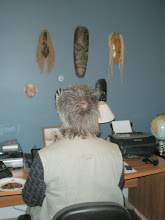As I read through our literature from time to time I'll jot down a phrase or sentence or paragraph that stands out and then try to organize these thoughts in a way that suggests a theme. The following quotes are in the category of "I need to work on me and not on you." Even though you're probably an idiot and I didn't do anything wrong and if I did it didn't hurt anyone but me and don't get me started on how crappy YOUR behavior is/was/will be, etc etc etc
There's a lot of stuff about how we react when someone else does actually behave poorly and how we should change so that we are actually the more tolerant, loving, and understanding individual instead of the one overreacting and attacking. Try it sometime - it ain't easy.
The one idea repeated more than once in the literature is that we should remember that other people can also be "sick." I don't like that word, personally. It gives me the opportunity to feel superior to someone else. Sometimes people make mistakes or they're having a bad day or they've had to be around me for years and years and it's finally enough, you know? I can't stand myself half the time so how other people put up with me is beyond human comprehension. I've always liked the qualifier of "broken." That, I believe, is a better description of Little Stevie Seaweed than "sick." Sick is not outrageously inappropriate, mind you, just not something that stimulates my imagination like the idea of being all busted up and ruined when I walked into The Rooms.
Putting out of our minds the wrongs others had done, we resolutely looked for our own mistakes. Though a situation had not been entirely our fault, we tried to disregard the other person entirely. The inventory was ours, not the other man's.
The first thing apparent was that this world and its people were often quite wrong. To conclude that others were wrong was as far as most of us ever got.
The moment we ponder a twisted or broken relationship with another person, our emotions go on the defensive. To escape looking at the wrongs we have done another, we resentfully focus on the wrong he has done us. This is especially true if he has, in fact, behaved badly at all.
Our present anxieties and troubles we cry are caused by the behavior of other people . . . To see how erratic emotions victimized us often took a long time. We could perceive them quickly in others, but only slowly in ourselves. Or if my disturbance was seemingly caused by the behavior of others, why do I lack the ability to accept conditions I cannot change? If I am unable to change the present state of affairs, am I willing to take the measures necessary to shape my life to conditions as they are?
Finally, we begin to see that all people . . . are to some extent emotionally ill as well as frequently wrong, and then we approach true tolerance and see what real love for our fellows actually means.
We realized that the people who wronged us were perhaps spiritually sick. Though we did not like their symptoms and the way these disturbed us, they, like ourselves, were sick, too.
Either we had tried to play God and dominate those about us, or we had insisted on being overdependent on them.
It never occurred to us that we needed to change ourselves to meet conditions, whatever they were.
So our troubles, we think, are basically of our own making. They arise out of ourselves, and the alcoholic is an extreme example of self-will run riot, though he usually doesn’t think so.

No comments:
Post a Comment